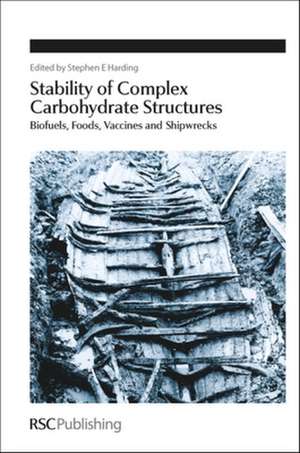Stability of Complex Carbohydrate Structures: Biofuels, Foods, Vaccines and Shipwrecks: Special Publication
Editat de Stephen E. Hardingen Limba Engleză Hardback – 11 dec 2012
Complex carbohydrates such as high molecular weight polysaccharides like starch and cellulose, are well known for their importance in foodstuffs, paper and wood, but their importance extends far beyond that into the biopharmaceutical, healthcare, oil and printing industries. This book, based on a discussion meeting organised by RSC Biotechnology and Carbohydrate Groups, brings together leading experts from the polysaccharide and glycoconjugate communities to review, discuss and assess in detail one specific topic, namely the importance of the stability and degradation of carbohydrate structures. Coverage includes applications as diverse as food, biopharmaceuticals, vaccines, biofuels and preservation of Viking boats. Providing essential reading for anyone interested in these structures and the diversity of their applications, it will appeal to a broad, multidisciplinary group from industry, academia and research institutions.
Din seria Special Publication
-
 Preț: 119.56 lei
Preț: 119.56 lei - 14%
 Preț: 930.39 lei
Preț: 930.39 lei - 14%
 Preț: 848.24 lei
Preț: 848.24 lei - 14%
 Preț: 772.72 lei
Preț: 772.72 lei - 14%
 Preț: 939.67 lei
Preț: 939.67 lei - 14%
 Preț: 782.17 lei
Preț: 782.17 lei - 14%
 Preț: 1062.13 lei
Preț: 1062.13 lei - 14%
 Preț: 934.04 lei
Preț: 934.04 lei - 11%
 Preț: 654.19 lei
Preț: 654.19 lei - 14%
 Preț: 832.20 lei
Preț: 832.20 lei - 14%
 Preț: 853.71 lei
Preț: 853.71 lei - 14%
 Preț: 940.46 lei
Preț: 940.46 lei - 11%
 Preț: 644.94 lei
Preț: 644.94 lei - 11%
 Preț: 648.03 lei
Preț: 648.03 lei - 14%
 Preț: 936.01 lei
Preț: 936.01 lei - 14%
 Preț: 932.36 lei
Preț: 932.36 lei - 14%
 Preț: 780.35 lei
Preț: 780.35 lei - 14%
 Preț: 782.83 lei
Preț: 782.83 lei - 11%
 Preț: 646.49 lei
Preț: 646.49 lei - 14%
 Preț: 775.53 lei
Preț: 775.53 lei - 14%
 Preț: 923.94 lei
Preț: 923.94 lei - 14%
 Preț: 790.28 lei
Preț: 790.28 lei - 14%
 Preț: 784.15 lei
Preț: 784.15 lei - 27%
 Preț: 2137.96 lei
Preț: 2137.96 lei - 11%
 Preț: 689.47 lei
Preț: 689.47 lei - 14%
 Preț: 778.71 lei
Preț: 778.71 lei - 14%
 Preț: 782.31 lei
Preț: 782.31 lei - 14%
 Preț: 944.44 lei
Preț: 944.44 lei - 11%
 Preț: 611.33 lei
Preț: 611.33 lei - 14%
 Preț: 776.37 lei
Preț: 776.37 lei - 14%
 Preț: 922.77 lei
Preț: 922.77 lei - 14%
 Preț: 778.02 lei
Preț: 778.02 lei - 11%
 Preț: 583.29 lei
Preț: 583.29 lei - 11%
 Preț: 653.17 lei
Preț: 653.17 lei - 5%
 Preț: 862.02 lei
Preț: 862.02 lei - 14%
 Preț: 773.13 lei
Preț: 773.13 lei - 14%
 Preț: 859.18 lei
Preț: 859.18 lei - 11%
 Preț: 657.77 lei
Preț: 657.77 lei - 14%
 Preț: 948.75 lei
Preț: 948.75 lei - 14%
 Preț: 786.15 lei
Preț: 786.15 lei - 14%
 Preț: 942.81 lei
Preț: 942.81 lei - 14%
 Preț: 857.37 lei
Preț: 857.37 lei - 14%
 Preț: 797.79 lei
Preț: 797.79 lei - 14%
 Preț: 960.02 lei
Preț: 960.02 lei - 14%
 Preț: 893.30 lei
Preț: 893.30 lei - 11%
 Preț: 681.43 lei
Preț: 681.43 lei - 14%
 Preț: 798.03 lei
Preț: 798.03 lei
Preț: 929.22 lei
Preț vechi: 1080.49 lei
-14% Nou
Puncte Express: 1394
Preț estimativ în valută:
177.80€ • 185.64$ • 147.16£
177.80€ • 185.64$ • 147.16£
Carte disponibilă
Livrare economică 14-28 martie
Preluare comenzi: 021 569.72.76
Specificații
ISBN-13: 9781849735636
ISBN-10: 1849735638
Pagini: 206
Dimensiuni: 163 x 240 x 19 mm
Greutate: 0.51 kg
Editura: Royal Society Of Chemistry
Seria Special Publication
ISBN-10: 1849735638
Pagini: 206
Dimensiuni: 163 x 240 x 19 mm
Greutate: 0.51 kg
Editura: Royal Society Of Chemistry
Seria Special Publication
Cuprins
Carbohydrates: First cousins of Water; Enzymic degradation of cell wall polysaccharides; Dietary Fibre: Functional Components and Mechanisms of Action in the Gastrointestinal Tract; Enzymatic treatment of polysaccharides; Stability of polysaccharide encapsulates; Polysaccharide and glycoconjugate vaccines; Mucin turnover; Some advances in hydrodynamic stability probes; Stability of chitosan and pectin as nasal and intestinal mucoadhesives; Cellulose crystallinity: perspectives from spectroscopy and diffraction; Cellulose; Cellulose de-construction: what can be learned from molecular modeling and dissolution experiments?; Lignin; Observations on bacterial degradation of historical wood timbers found in near anaerobic waterlogged environments; Subject Index
Notă biografică
Stephen Harding has been director of the National Centre for Macromolecular Hydrodynamics for the last 24 years, a period which has seen hydrodynamic methods (analytical ultracentrifugation, light scattering, viscometry etc.) come from almost oblivion to flourish as tools for biomolecular characterisation. He has published over 350 research papers and 9 books in the field of biomolecular hydrodynamics and applied biochemistry. In recognition of his discoveries he received a junior medal from the Royal Society of Chemistry in 1991 and a DSc from the University of Oxford in 2002. In 2010 he gave the prestigious annual Pfizer lecture at the University of Connecticut and in 2012 he was awarded by King Harald V den Kongelige Norske Fortjenstorden - the Royal Norwegian Order of Merit (Knight of the 1st class) - the highest award to a foreign non Head of State. His current focus is on biopolymer stability in response to bioprocessing, of particular interest to the Biopharma industry where he now draws much of his support.
Textul de pe ultima copertă
Complex carbohydrates such as high molecular weight polysaccharides like starch and cellulose, are well known for their importance in foodstuffs, paper and wood, but their importance extends far beyond that into the biopharmaceutical, healthcare, oil and printing industries. This book, based on a discussion meeting organised by RSC Biotechnology and Carbohydrate Groups, brings together leading experts from the polysaccharide and glycoconjugate communities to review, discuss and assess in detail one specific topic, namely the importance of the stability and degradation of carbohydrate structures. Coverage includes applications as diverse as food, biopharmaceuticals, vaccines, biofuels and preservation of Viking boats. Providing essential reading for anyone interested in these structures and the diversity of their applications, it will appeal to a broad, multidisciplinary group from industry, academia and research institutions.
Descriere
Based on the proceedings of a discussion meeting organized by the RSC Biotechnology and Carbohydrate Groups.










